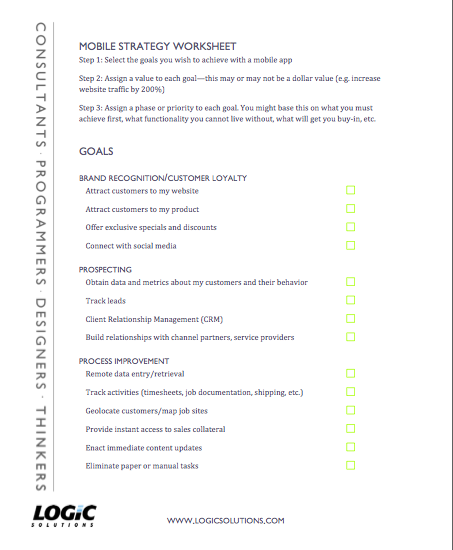 A few weeks ago we put together a mobile app development checklist to help you provide a framework for the discovery process of your mobile app project. We’ve been (pleasantly) surprised by the amount of love and attention our little checklist has received. It’s also raised a common request, namely: This is great, but I also need help with my mobile strategy.
A few weeks ago we put together a mobile app development checklist to help you provide a framework for the discovery process of your mobile app project. We’ve been (pleasantly) surprised by the amount of love and attention our little checklist has received. It’s also raised a common request, namely: This is great, but I also need help with my mobile strategy.
That might seem like a strange comment, but there is significant work that goes into defining both the functionality of the mobile app and the goals you wish to achieve with it. Sometimes outlining your plan is stickier than you might have envisioned, which becomes especially apparent when you’re trying to justify the expenditure to management.
A recent DemandGen Report article highlights some significant findings from Aberdeen Research, including the most popular reason companies deploy mobile applications relevant to sales activities: to support all crucial elements of the sales cycle without concern for physical location limitations.
While we LOVE that sentiment, “supporting all elements of the sales cycle” is a hefty task for one instance of any software, and trying to sell that idea to your decision-makers might be an uphill battle—they’re no dummies.
With that in mind, we’ve created another tool to help you put some context around the ROI you wish to achieve with a mobile app, and how to go about getting there.
[button href=”https://www.logicsolutions.com/mobile-apps/mobile-strategy-worksheet/” title=”Download the prep sheet” target=”self” shape=”rounded” size=”regular”] Download the Mobile App Development Checklist[/button]
Perhaps your immediate goal is to increase the probability of achieving your sales quota (you’re 23% more likely to do so when you have a mobile strategy, according to the same study), but you have a longer-term objective to increase website traffic by 200%. While your ultimate goal might still remain to “be all things to everyone,” this document can assist in helping you chunk your project achievement milestones into manageable bites, helping you drive the development process forward.





